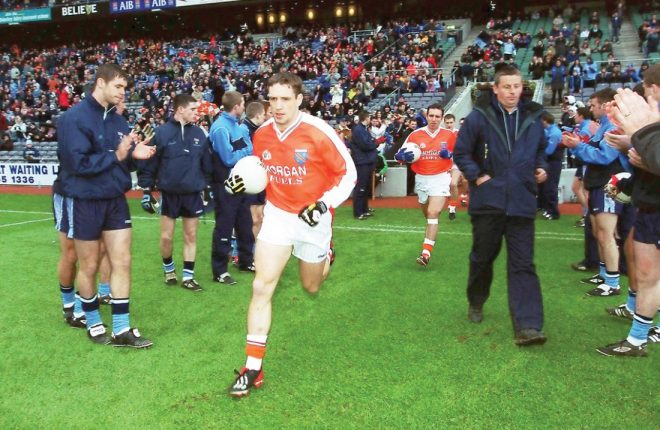
Armagh’s Kieran McGeeney had incredible confidence as a player, but he must lift his player’s confidence now as the manager of the county
Armagh and Derry recently suffered harrowing defeats in the Ulster Championship which would have seriously affected the confidence of their players.
Any coach or player will tell you that one of the most important elements in successful sports performance is self-confidence.
Players can perform to their best when they’re confident so developing a good general state of confidence is vital for withstanding and recovering from setbacks such as a defeat or a poor performance.
Armagh and Derry must strive to recover their confidence as soon as possible for the benefit of their future. What characteristics reflect a player’s confidence in training and games? These are:
(i) High self-belief – A real ‘I Can Do It’ attitude;
(ii) Projecting a positive image through good body language – Look Confident;
(iii) Enjoying/having fun in competition/training;
(iv) Not unduly worried about losing or consequences;
(v) Calm, collected, concentrated and high self-control;
(vi) Don’t feel the need to impress others;
(vii) Accept themselves for the way they are whilst understanding their strengths and weaknesses.
Developing confidence in a player or helping them regain confidence if they lost it, eg, to a bad defeat or a poor performance, is achieved by good coaching and management of players.
Here are ways, as a coach, you can build up confidence in your players and team:
1. Review past good individual or team performances
Modern technology allows coaches to send video-clips of individual players or the whole team or part of, performing excellent to phone, computer or tablet. These watched repeatedly, over and over, sometimes with affirming questions or statements attached beds in these pictures in their subconscious brain allowing them to repeat, strengthen or play better in future.
2. Goal setting for improved strengths – By considering the videos, the coach and his/her players can create new goals for individuals – either defensive or attacking players or whole/part team – to devise better ways to use their excellent skills seen on video. So goal-set when to master the skill of tactic or set piece and new variation of it devised by questioning as videos are watched.
3. Use ‘Pars’ – Positive Affirming Remarks – When ‘praising’ or ‘challenging’ your player(s), eg, ‘great power in that shot’ or ‘I know you can do it’ or ‘nobody fields a high catch like you’ or if challenging, eg, ‘forget your missed chances, your will to succeed and focus control and attention to detail will quickly have you scoring again; I’ve faith in you’.
4. Use verbal encouragement and show player(s) respect – Speak to each player regularly (one a week minimum), either a conversation about the positive aspects of their game or a short phrase in passing, eg, ‘your attitude is uplifting to the squad’. Treat young players with equal respect and let them know they are valued. Doing so helps players stick to team values.
5. Encourage/help players to use positive self-talk – eg, Muhammed Ali’s phrase “I am the greatest” or “I can do this as I’ve done it many times before.” etc.
6. Teach player to transform negative thoughts into positive thoughts – eg, “What if I miss this” becomes “I’ll get the next one”. “Who cares how well I do anyway” becomes “I care and I’ll be happier and better for the team if I push myself.”
7. Consider how successful players operate – Have players watch successful players in games/video. Don’t copy them but try to learn from their methods and adapt them to suit the player himself.
8. Use mental imagery – In training and in games, devise a ‘buzz word’, number or phrase to describe each set piece, each tactic within your game system and each facet of your game system in terms of defence, transition and attack. All involved should use these cues at all times as they become associated with each player’s imagination as they repeatedly train all the above game strategies. This ensures training regimes bed into the memory bank so that each player can use mental imagery subconsciously/automatically in training without thinking. This practice will deliver the ‘on-fire performances’.
Mental imagery helps players to: (i) Reinforce self-belief and players see themselves as winners; (ii) Learn self-control and coping strategies; (iii) Practice mentally what they experience in the game; (iv) Learn to focus and shut out distractions; (v) Improve relaxation which links mind and body to produce the right state of energy.
9. The trial, choose, walk, run, repeat, repeat approach – A must for all modern Gaelic teams which will give teams direction and understanding, raise self-esteem based on repetition in training and above all a high level of confidence, both developing or recovering. Coaches should:
- 1. Present a range of ideas on paper/magnetic board.
- 2. After discussing with players, trial a number (1 to 5) which suits your players’ strengths.
- 3. Train one at a time.
- 4. Walk the players through the plan, unopposed in a small area.
- 5. Walk them through with token opposition.
- 6. Run the moves unopposed, then when better at, run opposed on part pitch than full pitch.
- 7. Repeat, repeat, repeat until the process is instinctive.
- 8. Prepare in training, trial in games, perform in competition.
“If you don’t train the way you want to play, you won’t play as well as you can.”
If you do train your way, players’ confidence will soar
Receive quality journalism wherever you are, on any device. Keep up to date from the comfort of your own home with a digital subscription.
Any time | Any place | Anywhere











